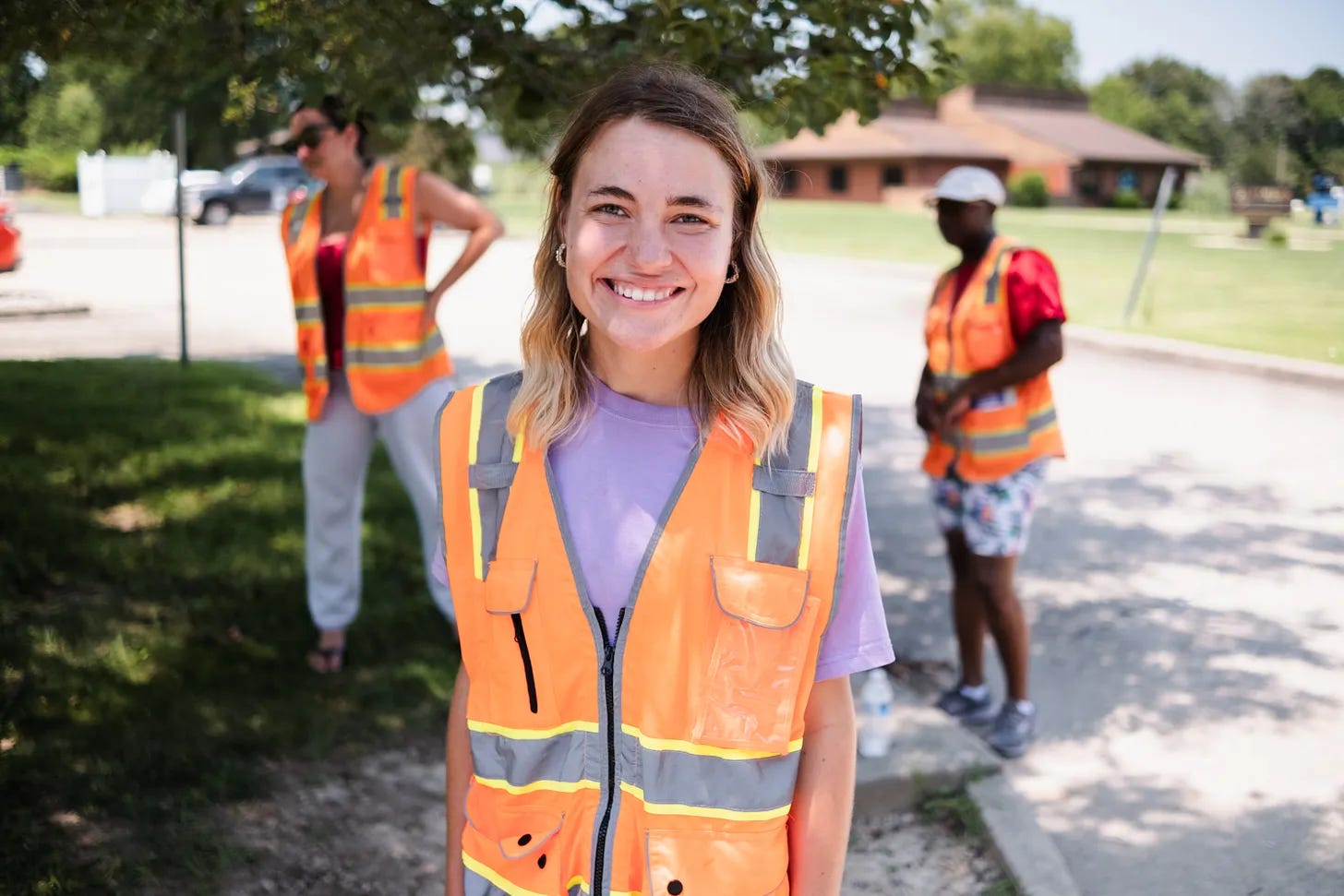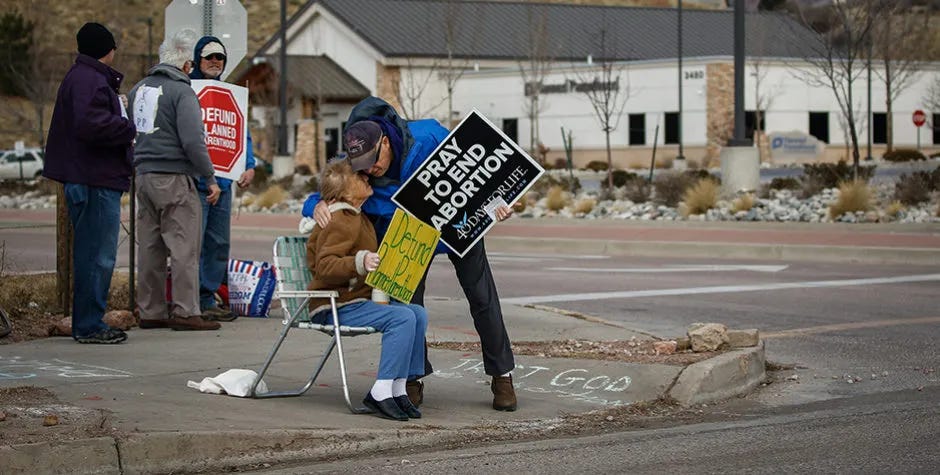Supreme Court Refuses to Hear Challenges to Abortion Clinic Buffer-Zone Laws
Justices Clarence Thomas and Samuel A. Alito Jr. said they would have taken the cases.

This story has been updated.
By Gary Gately
The U.S. Supreme Court on Monday refused to consider anti-abortion activists’ First Amendment challenges to laws that ban protests and sharply restrict “sidewalk counseling” in buffer zones outside abortion clinics.
The court’s majority declined to hear the challenges to the laws in Illinois and New Jersey, but Justices Clarence Thomas and Samuel A. Alito Jr. said they would have taken the cases.
In both challenges, anti-abortion activists had asked the court to overturn its 2000 Hill v. Colorado precedent upholding a state buffer zone law. The law, still in effect, prohibits anti-abortion activists from coming any closer than eight feet to another person in 100-foot buffer zones outside abortion clinics, sharing anti-abortion literature or engaging in “oral protest, education, or counseling” without permission of the clinics’ clients.
In a dissent to the decision not to review the law in the southern Illinois college town of Carbondale, Thomas argued that the Hill decision “manipulated this Court’s First Amendment jurisprudence precisely to disfavor” abortion opponents and deny them their “right to persuade women contemplating abortion that what they are doing is wrong.”
Thomas noted that the court’s majority said in the June 2022 Dobbs v. Jackson Women’s Health Organization decision overturning Roe v. Wade, which had established a constitutional right to an abortion for nearly a half-century, that the Hill ruling “distorted First Amendment doctrines.”
“Our refusal to provide clarity is an abdication of our judicial duty,” Thomas wrote in his dissent. “Following our repudiation in Dobbs, I do not see what is left of Hill. Yet, lower courts continue to feel bound by it….
“I would have taken this opportunity to explicitly overrule Hill. For now, we leave lower courts to sort out what, if anything, is left of Hill’s reasoning, all while constitutional rights hang in the balance.”
Thomas also pointed to the court’s unanimous 2014 decision in McCullen v. Coakley that a Massachusetts law that barred protests, counseling and other speech near abortion clinics violated the First Amendment.
Carbondale enacted its buffer-zone law in 2023, citing an increase in threats and intimidation by anti-abortion activists outside the three abortion clinics that opened there after nearby conservative states banned or greatly restricted abortion post-Dobbs.
The non-profit Coalition Life — which describes itself as a peaceful, pro-life “sidewalk counseling organization” whose members gather outside abortion clinics to try to persuade clients not to go through with the procedure — challenged the law. The city repealed the law just before Coalition Life asked the Supreme Court to review it last July after a federal judge and federal appeals court upheld it, citing the Hill precedent.
The law made it a crime to come within eight feet of another person without that person’s consent “for the purpose of passing a leaflet or handbill to, displaying a sign to, or engaging in oral protest, education, or counseling” within 100 feet of healthcare facilities.
The city said no one had been prosecuted under the law and argued that the case had become moot after the law’s repeal.
But in their petition to the Supreme Court, Coalition Life’s attorneys argued: “As things stand, jurisdictions in which anti-abortion views are disfavored have a ready tool to try to silence those who advance them — and to do so precisely when and where their speech may matter most…. The only way to avoid that dynamic is for this Court to overrule Hill once and for all.”
Brian Westbrook, Coalition Life’s founder and executive director, said the court’s decision to deny the group’s petition to hear the case will not deter its members from carrying out their mission.
“As we expand our operations to serve more women across the United States, we will continue to go wherever we are called,” Westbrook said in a statement. “At hundreds of abortion facilities, a different sort of tragic ‘denial’ continues. Cities and states across America are denying sidewalk counselors and law-abiding citizens their rights to inform women about their options.

In the New Jersey case, Catholic anti-abortion activist Jeryl Turco contended that an Englewood buffer-zone law violated her First Amendment right to free speech. The 2014 law bars anyone from standing within eight feet of the entrance to a healthcare facility unless they are patients, passersby or employees.
For more than 15 years, Turco has spoken to women approaching an abortion clinic to try to dissuade them from having abortions, handed out rosaries and literature about prenatal care and invited the women to accompany her to a pregnancy crisis center across the street.
She often tells women approaching the Englewood clinic “we can help you” and “we are praying for you.”
Turco initially won in federal district court, but the Philadelphia-based Third U.S. Circuit Court of Appeals reversed the decision in May 2023, ruling that the law is constitutional because it is “narrowly tailored, accords with the First Amendment and is not overbroad.”
The city said it adopted the ordinance, imposing a maximum penalty of a 90-day jail term and a $1,000 fine for violations, as a way to deal with aggressive protests from an evangelical group called Bread of Life. (Turco is not affiliated with Bread of Life.)
The appeals court found that the law served the city’s interests in protecting the health and safety of its citizens and their right to seek medical services, including at abortion clinics and facilities providing gender-transition procedures, also covered by the law.
Attorneys with the conservative Christian legal organization American Center for Law & Justice (ACLJ), who are representing Turco, argued in their petition to the Supreme Court last April that “while Dobbs did not pronounce a formal end to Hill, it has certainly placed that decision on its deathbed.”
“This Court,” the petition continued, “should not leave lower courts in the awkward position of needing to apply a decision that this Court has already disparaged as a distortion of the First Amendment. But until this Court overrules Hill, or at least explicitly recognizes that it ‘long ago abandoned’ that decision, lower courts must, where relevant, continue to apply it — to the detriment of First Amendment rights. Indeed, this case provides a clear example as to the mischief Hill creates.”
The ACLJ attorneys also cited the Sixth U.S. Circuit of Appeals 2022 ruling in Sisters for Life v. Louisville-Jefferson County that a "buffer zone" around a Kentucky abortion clinic's entrance violates the First Amendment, and the Supreme Court’s unanimous McCullen v. Coakley ruling striking down the Massachusetts buffer-zone law.
But in December 2023, the Supreme Court let stand the 23-year-old Hill precedent when justices declined to hear a Catholic sidewalk counselor’s challenge of a buffer zone in Westchester County, a New York suburb.
Abortion rights advocates have strongly backed the buffer zones, sometimes called bubble zones, saying they’re necessary to prevent pro-life sidewalk counselors from harassing those seeking abortions and to ensure safe access to clinics.
Alexis McGill Johnson, president of Planned Parenthood Federation of America, said: “No patient should have to encounter threats, intimidation and attacks while seeking health care — and no medical provider or health center staff should be threatened because of their work to deliver abortion care to patients in need. Buffer zones and bubble zones help to create a safer environment for patients, providers and staff.”
The court’s Monday decision to turn back the challenges to buffer zones came as the Trump administration significantly rolls back enforcement of the federal Freedom of Access to Clinic Entrances Act, known as the FACE Act. The 1994 law makes it a crime punishable by imprisonment, fines or both for threatening or obstructing someone seeking reproductive health services at abortion clinics as well as pro-life counseling services or other pregnancy support facilities.
The Justice Department said in a January 24 memo that prosecutions under the act represented “weaponization of law enforcement.”
Future abortion-clinic FACE Act prosecutions, the memo said, would be allowed only in “extraordinary circumstances or in cases presenting significant aggravating factors, such as death, serious bodily harm, or serious property damage.”
Meanwhile, about 20 House Republicans are backing a bill sponsored by Texas Representative Chip Roy that would repeal the FACE Act.
“The FACE Act was one of the primary weapons of abuse — being used to politically target, arrest, and jail pro-life Americans for speaking out and standing up for life,” Roy said in a statement.
President Donald J. Trump also pardoned what he called 23 “peaceful pro-life protesters” who had been convicted of blocking the entrances to abortion clinics, including at least a dozen who had received prison sentences.
Ten of those pardoned were convicted of staging a 2020 blockade at Washington Surgi-Clinic in the nation’s capital. Prosecutors said the anti-abortion activists relied on locks, ropes, chains and furniture to block the doors of the clinic while one of them live-streamed the blockade. It continued for several hours before police arrested the activists.
Abortion rights advocates said Trump’s pardons demonstrate his opposition to abortion access, his pledges to leave the issue to the states notwithstanding.
But abortion opponents praised the pardons.
After Trump signed the pardons, Steve Crampton, senior counsel at the Catholic legal organization the Thomas More Society, said in a statement: “Today, freedom rings in our great nation. The heroic peaceful pro-lifers unjustly imprisoned by Biden’s Justice Department will now be freed and able to return home to their families, eat a family meal, and enjoy the freedom that should have never been taken from them in the first place.”
The Catholic Church has been unwavering in condemning abortion, ]in the Vatican’s April “Dignitas Infinita” (“Infinite Dignity”), which listed abortion among “grave violations of human dignity.” Pope Francis has gone so far as calling abortion “murder.”
Ahead of the 2024 elections, the U.S. Conference of Catholic Bishops released a voters guide calling the threat of abortion “our preeminent priority because it directly attacks our most vulnerable and voiceless brothers and sisters.”
But a Pew Research Center survey released in April found that about 60% of American Catholics said abortion should be legal in all or most cases to 40% who said it should be illegal in all or most cases.
Among Catholic Democrats, 78% said abortion should be legal in all or most cases, compared with just 43% of Republican Catholics. Among Catholics who attend Mass at least weekly, only 34% said abortion should be legal in all or most cases while 66% said it should be illegal in all or most cases.


